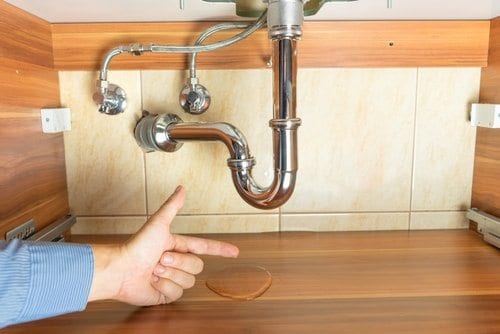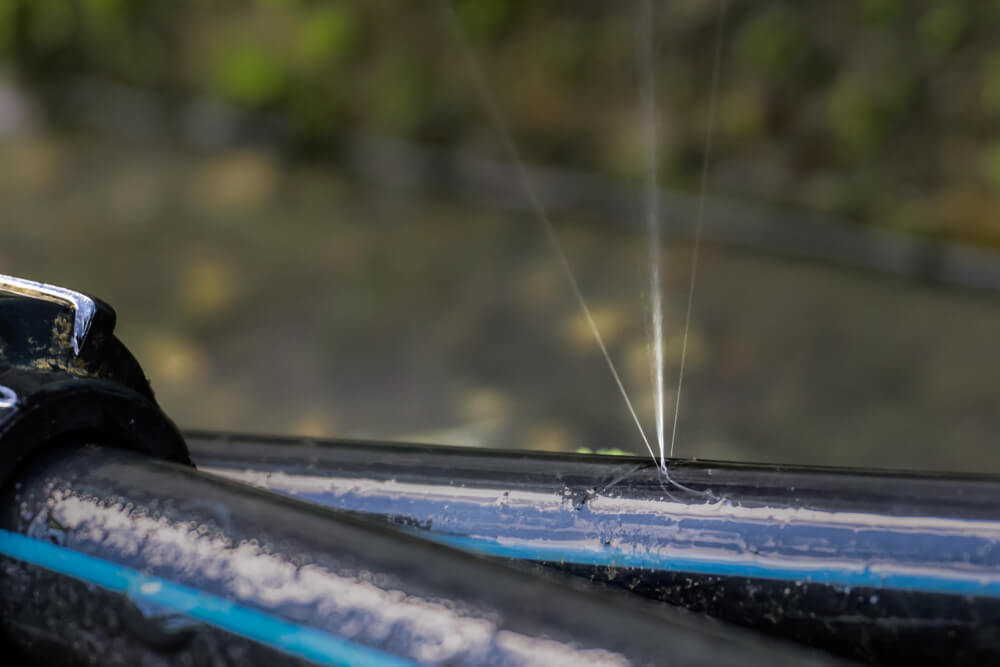What is a Pinhole Leak?

A pinhole leak is a tiny leak that forms on a pipe, allowing water to leak out. A pinhole leak may continuously leak or intermittently dribble, sometimes sealing itself only to begin leaking again later.
What’s most important about a pinhole leak is not what you see but what you can’t see. Pinhole leaks are typically an indication of significant internal pipe damage and deterioration. No leakage from a water supply line, no matter how insignificant it seems, should be considered “normal” and ignored.

What Causes a Pinhole Leak?
Ongoing processes of corrosion and pitting inside a water supply line eventually lead to an external pinhole leak. While the leakage may appear minor and easily patched, it’s a major red flag indicating the weakening of the pipe.
Water pressure in your water line is anywhere from 45 to 80 psi (pounds per square inch). Corrosion indicated by a pinhole leak could, at any moment, cause the weakened pipe to burst, releasing a torrent of water and causing severe damage.
Corroding waterlines will also contaminate potable tap water.
So, what causes a pinhole leak? Corrosion of water supply lines may occur for several reasons:
- Galvanized Steel Piping: Once a common material for water supply lines, galvanized steel is prone to corrosion over the years and will eventually rupture. If your lines are older, having them evaluated by a professional plumber is a good idea. If it’s galvanized steel instead of more contemporary materials, like copper, PVC, or PEX, it may be time to discuss options for re-piping.
- High Mineral Content: High concentrations of minerals in your local water supply, typically calcium carbonate, can accumulate and harden inside the supply lines. This layer of accretion tends to promote corrosion and pinhole leaks. If your pipes are affected by mineral accumulation, replacing them and installing a whole-home water softener will reduce the potential for further damage.
- Water Chemistry: Water with a naturally low pH is acidic and accelerates pipe corrosion and pinholes. Copper is the most widely used residential plumbing material, but it is particularly susceptible to acidic water. A plumber can check the pH of your local water supply and offer re-piping options like PVC or PEX that resist acidic corrosion.
- Turbulence: Plumbing codes require that cold water travels at eight feet per second and hot water at five feet per second through copper pipes. When water is pushed to a higher velocity, the turbulence can deteriorate the inner protective lining over time and develop leaks.
- End of Service Life: Different pipe materials have different expected lifespans. Copper piping has a service life of 25 to 30 years after installation. PVC has an expectancy of 50 to 100 years. PEX is 50 years. Galvanized steel is between 40 to 100 years. Homes built with galvanized steel in the 1970s or earlier are nearing their end of function life spans, and homeowners should be on the lookout for damage. Have a professional plumber inspect your pipe system to see if it is nearing its end of life.
- Improper Installation: Incorrect installation, cutting, and joining can accelerate internal corrosion and cause leaks. Improper fittings can cause turbulence and encourage corrosion.
Pinhole Leaks in PVC and PEX Lines
PEX and PVC are becoming much more common in residential plumbing. They are immune to corrosion and can withstand a wide temperature range and high pressures. PVC and PEX can still get pinhole leaks, however. Usually, the causes for PEX and PVC pinholes are:
- High levels of alkalinity or acidity
- High-velocity water
- Manufacturing defect
- Exposure to chemicals like pesticides or fertilizers
How to Fix & Prevent Pinhole Leaks in Residential Pipelines
Once a pipe starts developing pinhole leaks, there’s nothing to do except replace it. The leak should be temporarily sealed while scheduling repair, but remember that it could burst anytime. Turning off the water in that section of your pipes may be best.
Because the whole house plumbing system is often made of the same material, pinhole leaks indicate that you’ll need whole-home repiping.
To prevent future damage and ensure service life longevity, here are a few ways to prevent and slowdown pinhole leaks:
- Use professional plumbers for installation. They will check water velocity and keep it in a suggested range, as well as properly install pipe fittings and make sure pipes are correctly sized.
- Install a water softener.
- Schedule plumbing inspections when your pipe material is nearing the end of its service life.
Professional Plumbing Services For Any Home
Apollo Home offers expert plumbing services in Cincinnati, Northern Kentucky, and Dayton, Ohio. We offer repiping services, leak detection, leak fixes, plumbing inspections, and whole-home water softener installations. You can count on our plumbing experts to take care of your home and ensure it is in good, reliable condition.
Contact us today for more information on our plumbing services.


